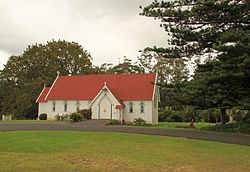| St James' Anglican Church | |
|---|---|
 St James' Anglican Church | |
| 35°13′06″S173°57′41″E / 35.21836°S 173.961379°E | |
| Address | 209 Kerikeri Road, Kerikeri, North Island |
| Country | New Zealand |
| Denomination | Anglican |
| Website | stjameskk |
| History | |
| Status | Church |
| Dedication | James the Great |
| Dedicated | 5 December 1878 |
| Architecture | |
| Functional status | Active |
| Architect | Marsden Clarke |
| Style | Gothic Revival |
| Construction cost | NZ£235 |
| Specifications | |
| Materials | Kauri weatherboard |
| Administration | |
| Diocese | Auckland |
| Parish | St Paul's, Whangaroa |
| Designated | 6 June 1985 |
| Reference no. | 68 |
St James' Anglican Church is an heritage-listed Anglican church located in Kerikeri, in New Zealand's Bay of Islands. The church dates to 1878 and replaced a larger chapel from 1829. Due to the buildings association with the establishment of Christianity and Anglicanism in New Zealand it is registered as a category 1 building with Heritage New Zealand.
